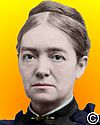 (source)
(source)
|
Mary Putnam Jacobi
(31 Aug 1842 - 10 Jun 1906)
American physician who became the first female member of the Academy of Medicine. She was skilled as a doctor, and advocated social reform to expand educational opportunities for women in medicine.
|
Science Quotes by Mary Putnam Jacobi (4 quotes)
During the long ages of class rule, which are just beginning to cease, only one form of sovereignty has been assigned to all men—that, namely, over all women. Upon these feeble and inferior companions all men were permitted to avenge the indignities they suffered from so many men to whom they were forced to submit.
— Mary Putnam Jacobi
In “Common Sense” Applied to Woman Suffrage (1894), 180.
It is one thing to say, “Some men shall rule,” quite another to declare, “All men shall rule,” and that in virtue of the most primitive, the most rudimentary attribute they possess, that namely of sex.
— Mary Putnam Jacobi
In “Common Sense” Applied to Woman Suffrage (1894), 84.
Men, accustomed to think of men as possessing sex attributes and other things besides, are accustomed to think of women as having sex, and nothing else.
— Mary Putnam Jacobi
In “Common Sense” Applied to Woman Suffrage (1894), 180.
The most important effect of the suffrage is psychological. The permanent consciousness of power for effective action, the knowledge that their own thoughts have an equal chance with those of any other person … this is what has always rendered the men of a free state so energetic, so acutely intelligent, so powerful.
— Mary Putnam Jacobi
In “Common Sense” Applied to Woman Suffrage (1894), 180.
See also:
- 31 Aug - short biography, births, deaths and events on date of Jacobi's birth.
- In Memoriam: Mary Putnam Jacobi - by Dr. William Osler (1907)
- Sympathy and Science: Women Physicians in American Medicine, by Regina Morantz-Sanchez. - book suggestion.
 In science it often happens that scientists say, 'You know that's a really good argument; my position is mistaken,' and then they would actually change their minds and you never hear that old view from them again. They really do it. It doesn't happen as often as it should, because scientists are human and change is sometimes painful. But it happens every day. I cannot recall the last time something like that happened in politics or religion.
(1987) --
In science it often happens that scientists say, 'You know that's a really good argument; my position is mistaken,' and then they would actually change their minds and you never hear that old view from them again. They really do it. It doesn't happen as often as it should, because scientists are human and change is sometimes painful. But it happens every day. I cannot recall the last time something like that happened in politics or religion.
(1987) -- 


